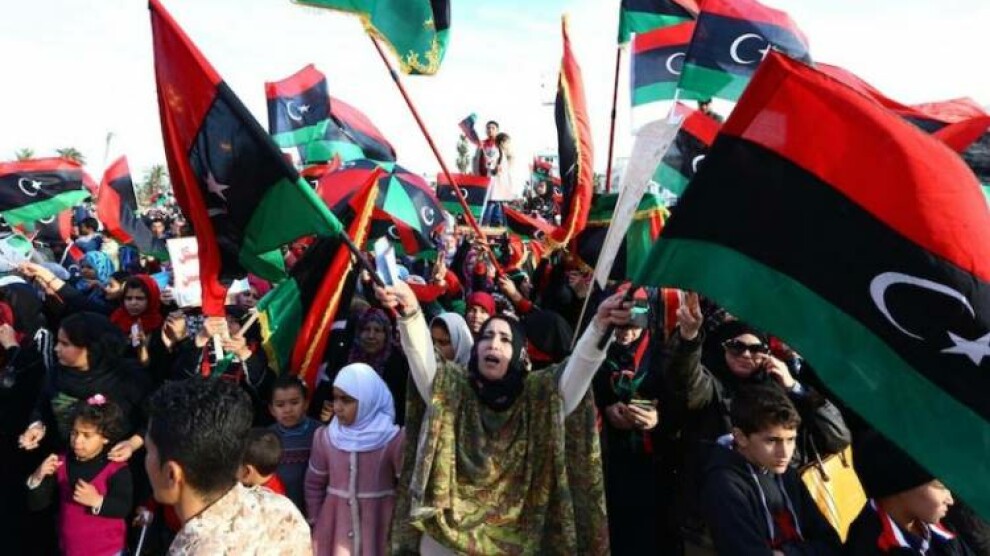Start of Libyan women’s era in struggle for trade unions– 1
Struggle for trade unions from past to today While the struggle for unions differs from country to country, this struggle continues in Libya, where strikes have been banned since 1972, despite all pressures. The activities of trade unions are seen as a danger in non-democratic countries, the collective bargaining process in Muslim countries also differs from each other. In our two-day article series, we will share information about the activities of trade unions in Libya and women’s struggle in unions. In the second part of the article series, we will share our interview with Nermin Sharif, the president of the Libyan General Federation of Trade Unions.

Struggle for trade unions from past to today
While the struggle for unions differs from country to country, this struggle continues in Libya, where strikes have been banned since 1972, despite all pressures. The activities of trade unions are seen as a danger in non-democratic countries, the collective bargaining process in Muslim countries also differs from each other. In our two-day article series, we will share information about the activities of trade unions in Libya and women’s struggle in unions. In the second part of the article series, we will share our interview with Nermin Sharif, the president of the Libyan General Federation of Trade Unions.
IPTÎSAM AXFÎR
Libya - Economic and political systems affect social structures and social structures also affect economic and political systems. Although Muslim countries are rich in oil reserves and natural resources, their economic status and welfare levels are lower than these resources. When these countries are classified, their three common features reveal; they are oil-rich, newly industrializing, and less developed countries. These countries have common characteristics; they have a high population and rapid population growth. Despite their potential power, the instability in their political structures negatively affects both political and commercial cooperation.
A dependency relationship that cannot be broken
The industrial revolution didn’t affect the Muslim countries as it did in the western countries. Industrialization began in Muslim countries under different conditions and for different purposes. A dependency relationship that cannot be broken was created in these countries. The regional divisions of the production process, the dependency on developed countries, and the efforts to integrate them into markets have increased the dependency of Muslim countries. This dependency has also led to the development of class structures. The Muslim countries, which got to know the practices of trade unions and collective bargaining, have been under the influence of capitalist and socialist systems while trying to respect Islamic principles.
Differences and similarities
Union rights are fundamental human rights. These rights allow every worker to join or form a union without interference. The historical development of trade unions in Muslim countries shows us they have similarities as well as differences.
The right to collectively bargain
One of the most important functions of trade unions is the right to collectively bargain. The strengthening of trade unions and the development of collective rights led to a system of collective bargaining. This system allows public sector workers to bargain collectively. Although collective bargaining is one of the most basic functions of trade unions, they have faced prohibitions and restrictions. Restrictions on the right to collectively bargain determine who can benefit from this right, which unions can use this right, the number of members to have this right, the level of collective bargaining agreements, and the duration and content of collective bargaining agreements. These restrictions exist in Muslim countries like in other countries.
Pakistan
The process of collective bargaining in Muslim countries is very different from each other. In Pakistan, a registered trade union is elected by secret ballot to have the right to bargain collectively. If they don’t come to an agreement in the collective bargaining process, they try to solve this problem through bilateral negotiations. If the parties agree on the collective bargaining agreement, the arbitrator gives his or her award within a period of 30 days or a period agreed upon by the parties. The award of the arbitrator is final and valid for a period not exceeding two years. If the parties have not agreed to refer their dispute to an arbitrator, the workers retain the right to go on strike providing due notice to their employer within seven days. The essential sectors under the Pakistan Essential Services (Maintenance) Act, 1952 are not allowed to bargain collectively.
The right to strike
The right to strike is an important right for workers to engage in other concerted activities for the purpose of collective bargaining or other mutual aid or protection. The workers go on a strike to demand their rights. The right to strike is an integral part of trade union rights and it is a very important right in Muslim countries, like in other countries. While some countries prohibit going on a strike, some restrict it, and some recognize it as a right. But workers face many obstacles to go on a strike even if the right to strike is awarded.
The struggle of trade unions in Libya
In Libya, strikes have been banned since 1972 even if trade unions exist in the country. In the mid-1980s, there were some 275,000 members belonging to 18 trade unions, which together formed the Tripoli-based National Trade Union Federation. In addition, teachers, engineers, physicians, lawyers, and other professionals have their own trade unions.
Tomorrow: Nermin Sharif: I keep struggling despite all the pressure
